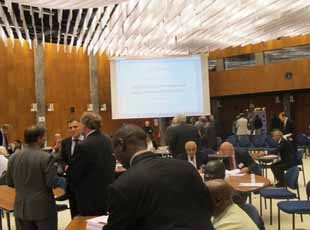WCC meet focuses on minority rights
@@NEWS_SUBHEADLINE_BLOCK@@
 Geneva, September 20: A three-day World Council of Churches (WCC) consultation has featured diverse perspectives from Asia, Africa, Middle East and Europe on the politicization of religion and how this phenomenon contributed to discrimination and persecution of religious minorities around the world.
Geneva, September 20: A three-day World Council of Churches (WCC) consultation has featured diverse perspectives from Asia, Africa, Middle East and Europe on the politicization of religion and how this phenomenon contributed to discrimination and persecution of religious minorities around the world.
Organized by the WCC Commission of the Churches on International Affairs (CCIA), the event brought together religious leaders, social and human rights activists, diplomats, academics and scholars from September 16 to 18 at the Ecumenical Centre in Geneva, Switzerland.
Speaking from an African experience, Rev. Lesmore G. Ezekiel of Nigeria shared how the constitution of the Nigeria ensures freedom of thought, conscience and religion. However, he added that religious fanaticism has contributed immensely in politically dividing Nigeria.
Ezekiel added that fanaticism has accounted for continuing intolerance, affecting Christians in the north and Muslims in the south. “Therefore, politics must be positively influenced by religion and religion must not be manipulated by political bigots for their selfish gains,” he added.
Joseph Daher, a Syrian participant, shared historical contexts and described the complex political situation in the Syria, speaking about communities such as Christians and Kurds.
Daher defined secularism in the Syrian sense while reflecting on politicization of religion. He said that “secularism is part of our struggle to liberate religion from political parties and to let people live freely their religion without the oppression of the state. Our secularism does not differentiate from the different sects and ethnicities, and opposes any discrimination.”
In a panel featuring speakers from Asia, Dr Charles Amjad-Ali, an academic from Pakistan, spoke about the colonial history and laws introduced during the years of dictatorship, which resulted in the persecution of religious minorities in Pakistan.
He said in respect to true democracy and rights, that minorities get a special privileged status and protection. Therefore, Amjad-Ali added, “all the minorities should struggle, and continue to struggle very hard, for democracy and rights for all Pakistanis”.
Prof. Faizan Mustafa, Vice-Chancellor of National Law University in Hyderabad, said that despite constitutional guarantees of religious freedom in India, seven Indian states have passed discriminatory laws owing to which Christians and Hindus face discrimination.
He was probably referring to the freedom of indigenous faith bills passed by Indian states of Arunachal Pradesh, Madhya Pradesh, Chhattisgarh, Rajasthan etc. to check the conversion of Hindus, especially tribals and scheduled castes to Christianity.
Advocate Subrata Chowdhury, vice president of the Bangladesh Hindu Buddhist Christian Unity Council, echoed these views when he stated that politicization of religion has already destroyed the long nurtured communal and religious harmony in Bangladesh.
The representatives from Pakistan and Bangladesh failed to highlight or deliberately chose to remain silent on the plight of Hindus in Pakistan and Bangladesh who are minorities there and that too most persecuted ones. Thousands of them are seeking shelter in India due to religious persecution. Because they were not Christians, their plight was not discussed in WCC conclave.
Another participant from Indonesia, Rev. Elga Sarapung, stressed the significance of freedom of religion and belief. To make sure that the rights of religious minorities are protected, she said, “leaders of all religions should initiate a continuous intra- and inter-religious dialogue, and also with governments, to find out the best ways of how to live together in diversity.”
Speaking from his experiences in Malaysia, Rev. Dr Philip Thomas said that although the Malaysian constitution stipulates freedom of religion, minority religions face discrimination and are victims of preferential treatment of other faiths as a result of the growing politicization of religion.
The consultation also discussed the content of a proposed statement on the politicization of religion and the rights of religious minorities which will be presented at the WCC 10th Assembly, to be held from 30 October to 8 November in Busan, Republic of Korea.